游戏中有什么?一个基于游戏的方法来探索21世纪的欧洲身份和价值观
Q1 Arts and Humanities
引用次数: 2
摘要
本文关注的是一个关于游戏化国家认同的国际项目的早期阶段。它考察了通过基于游戏的学习,开发一种复杂而引人入胜的教育教学创新方法所需的内容的生产。这将鼓励个人思考欧洲和国家身份,特别是在欧盟(EU)的背景下。在欧盟面临重大挑战的时候,更好地理解和欣赏国家和超国家认同和欧洲归属感的作用是显而易见的。俄罗斯欧盟?是一项由伊拉斯谟+资助的项目,旨在开发一款创新的在线游戏,帮助学生和其他人增强对自己国家和欧洲身份的理解,并挑战态度和偏见。游戏的内容开发汇集了具有社会政治知识、教学理解和技术专长的专家。本文讨论了内容开发过程的早期阶段,在此期间,我们从文献综述、学术访谈、学生焦点小组和调查中收集材料。我们试图确保游戏内容能够反映游戏开发生命周期中出现的问题,我们的文章描述了我们与这些材料的接触,并将其整合到游戏内容中。本文章由计算机程序翻译,如有差异,请以英文原文为准。
What’s In a game? A game-based approach to exploring 21st-century European identity and values
ABSTRACT This article focuses on the early stages of an international project on gamifying national identity. It examines the production of the content required for developing a sophisticated and engaging approach to pedagogical innovation in education, through game-based learning. This will encourage individuals to think about both European and national identity, specifically within the context of the European Union (EU). At a time when the EU faces significant challenges, a better understanding and appreciation of the role of national and supra-national identity and belonging in Europe is clear. RU EU? – an Erasmus+ funded project – aims to develop an innovative online game to help students and others enhance their understanding of their own national and European identities and challenge attitudes and prejudices. The content development of the game has brought together experts with socio-political knowledge, pedagogical understanding and technical expertise. This article discusses the early stages in the content development process, during which we amassed material from literature reviews, academic interviews and student focus groups and surveys. We sought to ensure that the content of the game reflected the issues raised within the game development lifecycle and our article describes our engagement with this material and its integration into game content.
求助全文
通过发布文献求助,成功后即可免费获取论文全文。
去求助
来源期刊

Open Review of Educational Research
EDUCATION & EDUCATIONAL RESEARCH-
CiteScore
2.60
自引率
0.00%
发文量
0
审稿时长
22 weeks
 求助内容:
求助内容: 应助结果提醒方式:
应助结果提醒方式:


